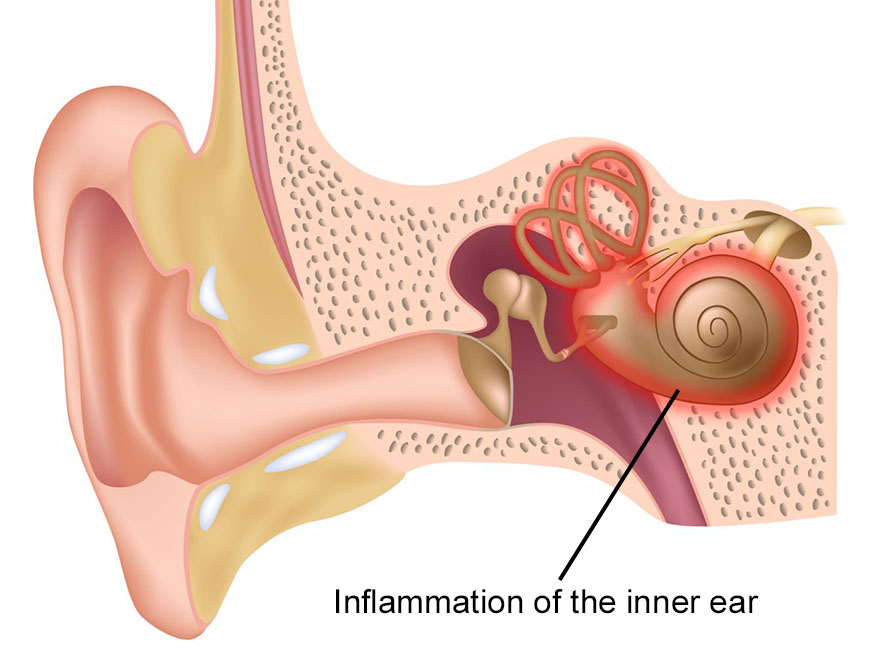Labyrinthitis: Symptoms, Causes, Treatment
What are the symptoms of labyrinthitis?
Labyrinthitis is an inner ear disorder that is often caused by a viral infection. It is characterized by inflammation of the labyrinth, which is the part of the inner ear that helps control balance and hearing. Symptoms of labyrinthitis can vary but may include:
- Vertigo: A sensation of spinning or dizziness that can be intense and may be accompanied by nausea and vomiting.
- Hearing loss: Some people with labyrinthitis experience a temporary decrease in hearing in one ear.
- Tinnitus: Ringing, buzzing, or other noises in the ear.
- Imbalance or unsteadiness: Difficulty maintaining balance or walking straight.
- Nystagmus: Involuntary eye movements, which may be rapid or jerky.
- Ear pain or pressure: Some individuals may experience pain or pressure in the affected ear.
- Symptoms of viral infection: In some cases, labyrinthitis may be preceded by symptoms of a viral infection, such as a cold or flu-like symptoms.
Symptoms of labyrinthitis can vary in severity and may come on suddenly. If you experience symptoms of labyrinthitis, especially if they are severe or persistent, it’s important to see a healthcare professional for an accurate diagnosis and appropriate treatment.
What are the causes of labyrinthitis?
Labyrinthitis is most commonly caused by a viral infection, such as the same viruses that cause the common cold or flu. However, it can also be caused by bacterial infections, although this is less common. Other potential causes of labyrinthitis include:
- Viral infections: Viruses such as herpes simplex virus, influenza virus, and Epstein-Barr virus can cause labyrinthitis.
- Bacterial infections: Bacterial infections that can lead to labyrinthitis include infections of the middle ear (otitis media) or infections that spread from other parts of the body.
- Respiratory infections: Infections of the respiratory tract, such as sinus infections or bronchitis, can sometimes lead to labyrinthitis.
- Vestibular neuritis: This condition is similar to labyrinthitis but involves inflammation of the vestibular nerve, which connects the inner ear to the brain.
- Autoimmune disorders: In some cases, labyrinthitis may be associated with autoimmune disorders, where the immune system mistakenly attacks the inner ear.
- Head injury: Trauma to the head or ear can sometimes lead to labyrinthitis.
- Allergies: Some researchers believe that allergies may play a role in the development of labyrinthitis, although this is not well understood.
Labyrinthitis is often a temporary condition that improves on its own over time. However, in some cases, treatment may be needed to manage symptoms or to address any underlying infections. If you suspect you have labyrinthitis, it’s important to see a healthcare professional for an accurate diagnosis and appropriate treatment.
What is the treatment for labyrinthitis?
The treatment for labyrinthitis depends on the underlying cause and the severity of symptoms. In many cases, labyrinthitis resolves on its own as the body fights off the viral or bacterial infection. However, there are several treatment options that may help manage symptoms and speed up recovery:
- Medications:
- Antibiotics: If the cause of labyrinthitis is bacterial, antibiotics may be prescribed to treat the infection.
- Antiviral medications: In cases where labyrinthitis is caused by a viral infection, antiviral medications may be prescribed, although their effectiveness is debated.
- Medications for symptoms: Medications may be prescribed to help manage symptoms such as vertigo, nausea, and vomiting. These may include antihistamines, antiemetics, or vestibular suppressants.
- Home care:
- Rest: Getting plenty of rest can help the body recover more quickly.
- Hydration: Avoiding dehydration can help manage symptoms such as nausea and dizziness.
- Avoiding triggers: Avoiding triggers that worsen symptoms, such as bright lights or sudden movements, can help manage symptoms.
- Vestibular rehabilitation: This is a type of physical therapy that can help improve balance and reduce dizziness by promoting the brain’s ability to compensate for inner ear problems.
- Surgery: In rare cases where labyrinthitis is severe and does not respond to other treatments, surgery may be recommended to relieve pressure in the inner ear or to repair damaged structures.
It’s important to consult with a healthcare professional for a proper diagnosis and to discuss the most appropriate treatment options for your specific situation.




